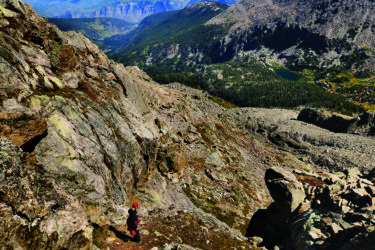The Local newsletter is your free, daily guide to life in Colorado. For locals, by locals.
Arapahoe Basin Ski Area is ready to set some limits.
It’s not about having too many skiers on the mountain. And it’s not due to lift lines growing too long. According to Alan Henceroth, A-Basin’s chief operating officer who first skied there in December 1983 (and began working at the mountain in 1988), the on-mountain ski experience is actually more manageable today than it was almost 40 years ago.

“We were doing half the skiers in the ‘80s that we do now,” he says. “But we also have three times as much terrain now than we did then. Lift lines are shorter.”
Yet for the 2021-’22 season, the mountain is planning to sell 10 percent fewer unrestricted season passes and day tickets than it did this season and is eliminating in-person ticket purchases altogether. Why is A-Basin self-restricting pass sales after enduring two pandemic-abridged seasons?
In a word: parking.
The once-small ski area has grown dramatically in the decades since Henceroth first skied it, and the parking and base-area infrastructure reached a breaking point—which was a key reason A-Basin ended its decade-long Epic Pass partnership in 2019 and later inked a deal with the Ikon Pass, which Henceroth says has fewer passholders.
“We took our first really big step a couple years ago when we left Vail Resorts,” Henceroth says. “We frankly weren’t big enough to hang with that many passholders. Too many people were showing up.”
But even now, the mountain is still growing at a brisk clip and traffic congestion remains a stress point because creating additional parking is not as easy as it sounds. Henceroth is focused on delivering an enjoyable experience to as many guests as possible, which is hard to guarantee if a skier’s visit begins with a hellish parking scene.
“It’s about where people are having fun,” Henceroth says. “When people have to wait to park, or there’s not a parking spot when they arrive and we say come back in an hour or two, or maybe we park them in the overflow lot four miles away, they don’t like that as much.”
Prior to the pandemic, A-Basin flirted with the idea of limiting season pass sales and mandating day passes be purchased ahead of time, but Henceroth was against it. He didn’t think the marketplace would support that sort of change, and he didn’t think skiers would appreciate it. But then COVID-19 forced A-Basin and other mountains to enact those types of crowd-control measures and, to his surprise, it worked.
“As bad as COVID-19 was, there was a lot of stuff we learned,” he says. “We were able to control our numbers in a way we never could before. In terms of managing tickets, I think in a few months we learned lessons that would have taken us five years to learn otherwise.”
The pandemic expedited the mountain’s evolution, and what Henceroth saw convinced him he could limit visits and still run a lean business. Already, season passes for next season are selling faster than he’s ever seen before (as of mid-April, only one-third of the allotted passes for next season were still available), which has him feeling confident about the season ahead: “We think we’re going to do a little better on every person that visits. And they’re going to get a better experience.”
As a result of all these changes, A-Basin doesn’t expect to implement a reservation system next season (Ikon Pass users had to make reservations for most of the 2020-’21 season), and Henceroth hopes more flexible work schedules will allow more skiers to visit Monday through Friday, taking pressure off weekends.
If all goes to plan, he hopes it will ultimately preserve the character of the mountain he first discovered in 1983.








